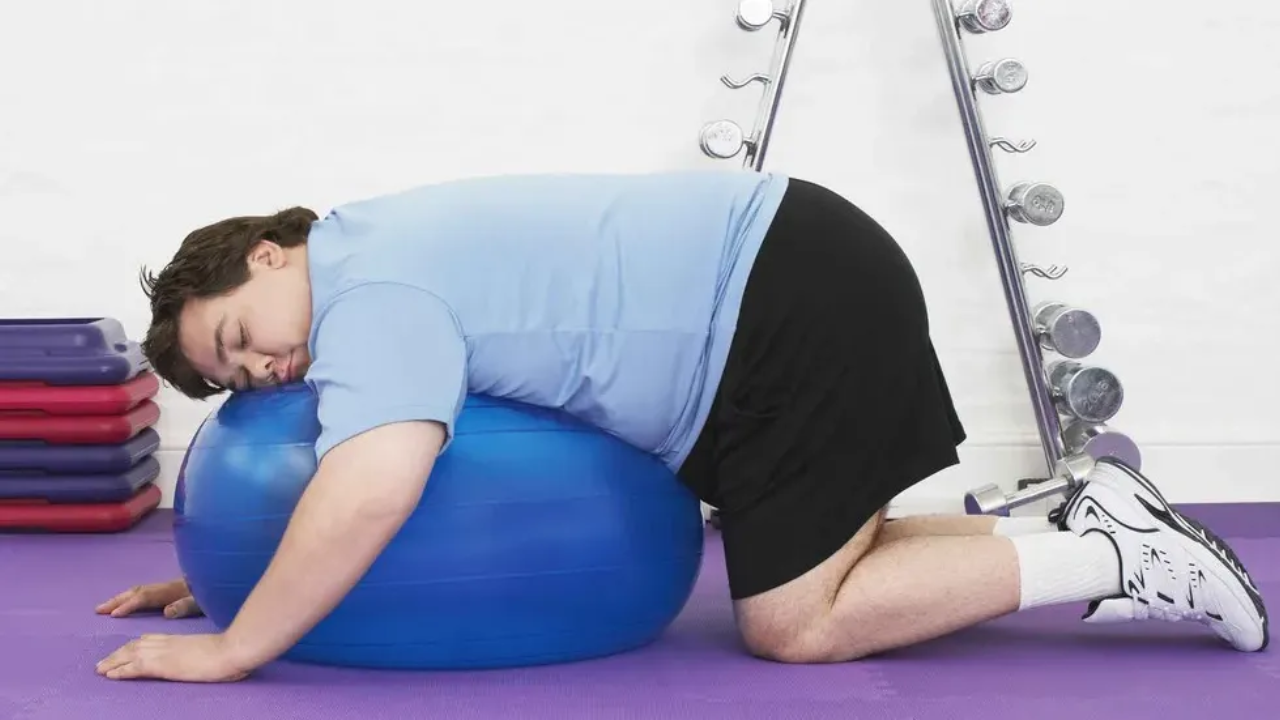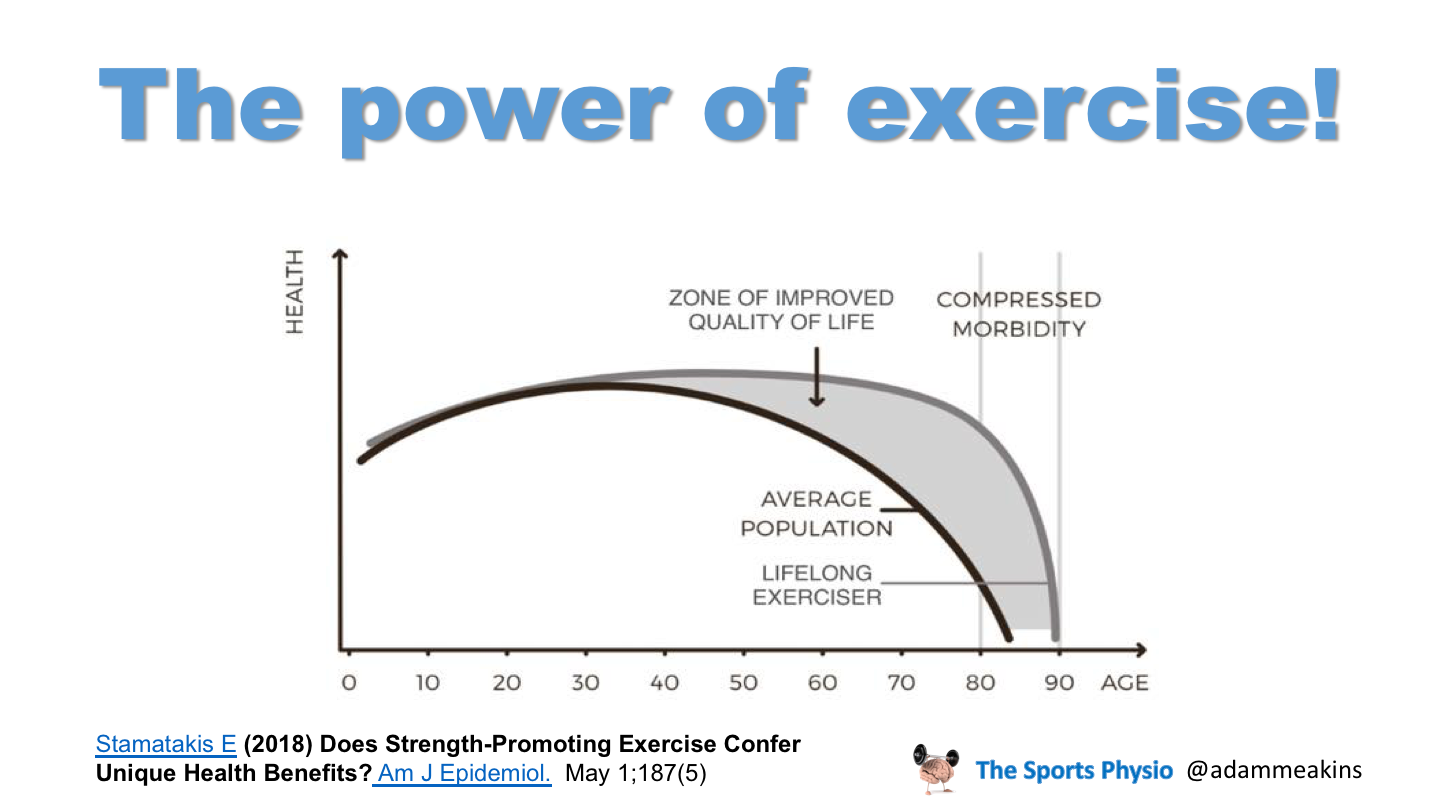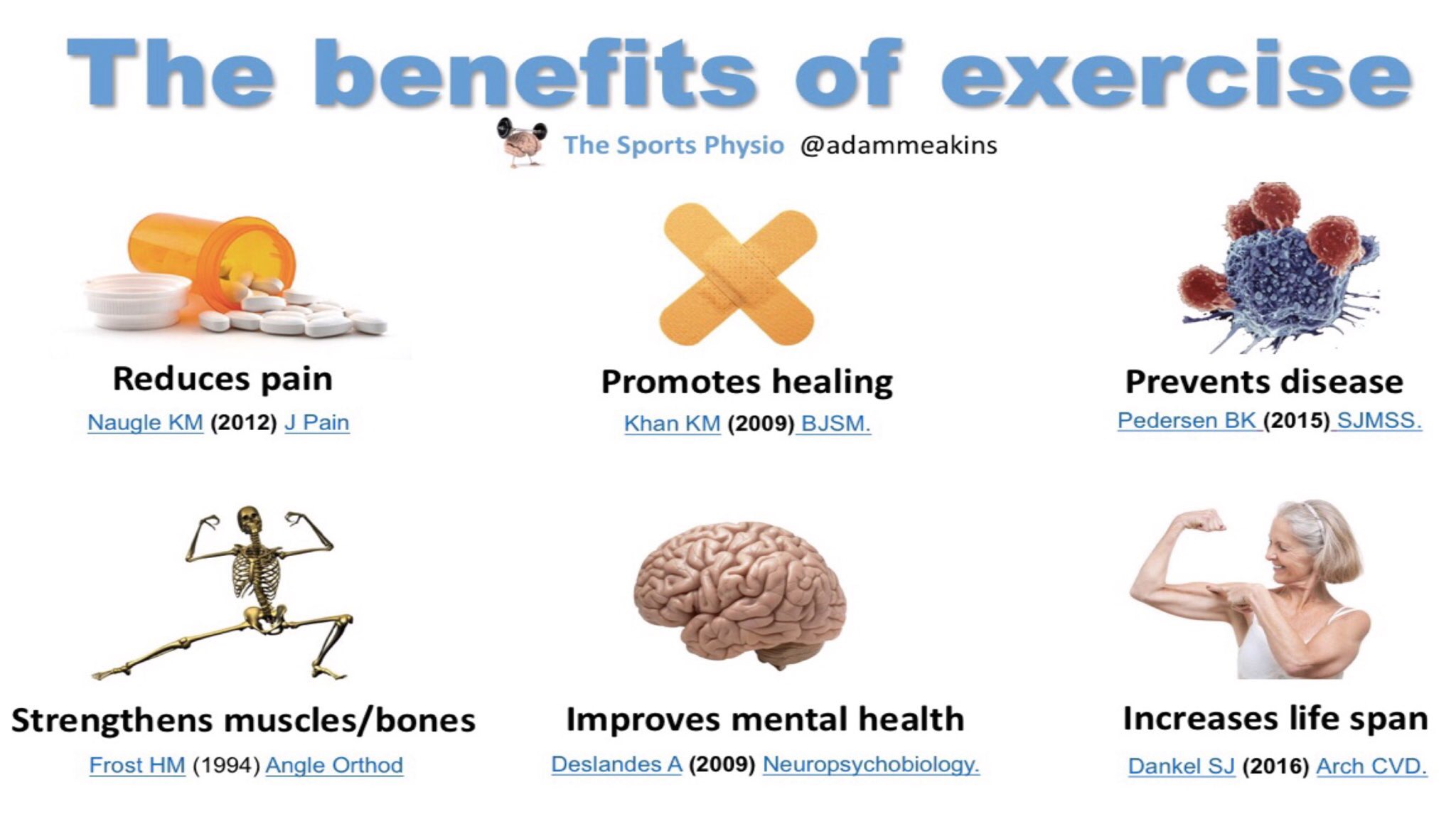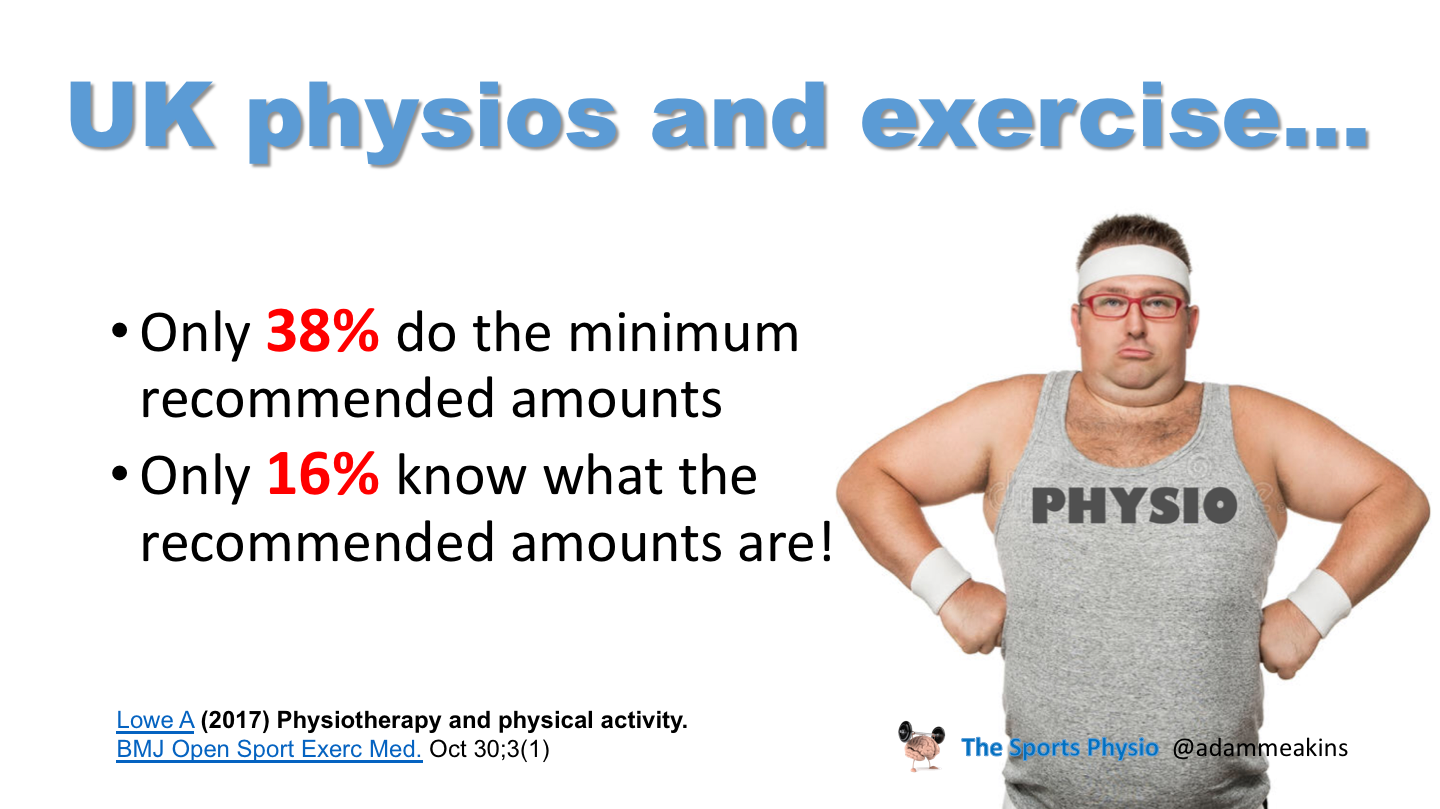Why Do Physio Not Exercise? A guest blog by Nick Emery
Jul 15, 2018
So the NHS has reached 70 recently, but what does the future hold for it? The report ‘How Good is the NHS? highlighted that overall the NHS did OK, and considering it has fewer staff and spends less on health care per capita than the majority of similar counties we should be hugely proud of our NHS and give ourselves a big pat on the back.
But the NHS is far from perfect, in fact, this report also highlights that the NHS fails or is poor at treating a long list of conditions such as;
- Breast cancer
- Colorectal cancer
- Lung cancer
- Pancreatic cancer
- Lung disease
- Stroke
- Heart attacks
- Diabetes
- Dementia
These non-communicable diseases place a huge burden on the NHS financially and through hospital admissions, but you may be thinking what have these got to do with physiotherapy and me? These are all medical conditions and I’m a neuro, orthopaedic, respiratory, community, paediatric, or some other physio; These conditions are not my problem or responsibility. Well, they are.
Physiotherapy should be at the forefront of prescribing the best available healthcare and this includes exercise. We are one of the few healthcare professions (and I use that term ‘profession’ lightly in this respect) that has significant face time with a great many people that are in need of guidance, signposting, and education of the importance of exercise. However, a recent paper by Lowe et al 2017 found not only do UK physiotherapists have a mediocre knowledge of the very basics of exercise, but the vast majority do not do the bare minimum amounts of what is considered necessary to maintain a healthy life.

Physical inactivity has a significant impact on morbidity and mortality (Lee, et al 2012). Physically inactive people spend 38% more days in hospital and use healthcare resources significantly more than healthy active people (Sari, 2009). Many of these inactive people turn up in our physio clinics or outpatient departments seeking our help, often due to the consequences of their inactivity which start to manifest and affect their ability to function. But how many physiotherapists discuss, encourage or facilitate these patients to engage in basic lifelong exercise?
Well in the recent Lowe paper they found that a favourable 77% of UK physios discussed exercise with their patients, and 66% routinely delivered brief exercise interventions in their treatments. Unfortunately, the paper does not detail what these brief interventions are, but I suspect it is the usual 3 set of 10 reps bollocks with a flimsy yellow theraband, which seems to be the default go-to exercise prescription for most physios.
However, far more disappointing is that only 16% of physios correctly answered the questions about the content of the physical activity guidelines. This is just inexcusable. These guidelines are not hidden in some secret bunker, they are freely and easily available through various channels (DoH, 2011, WHO, 2017, ASCM, 2011) and should be instantly quotable by all physiotherapists. It’s such basic knowledge.
So where does the fault lie that so many UK physios don't know this stuff? I guess we can blame the universities? And, yes some undergraduate courses don’t teach or have a module covering exercise in any great detail. And if they do, how much do the students engage with it and to what extent is the importance of exercise promoted? Very little I suspect.
Really the fault lies, with physiotherapists themselves not bothering to learn something that will, if used correctly, change the lives of all the people they see, as well as eventually save the NHS and wider society billions of pounds and develop a more productive, able population.
For example, in 2002 obesity alone cost the NHS £2 billion (Butland et al 2007) and by 2006 this was over £5 billion (Scarborough et al 2007). Now I’m not suggesting exercise alone can address the obesity issue, but it is known that those who exercise more often tend to be more diet and health conscious. Unless we get this under control the NHS is heading for a tsunami of health-related issues on this one issue alone. Could the NHS survive when projected costs of obesity alone are expected to be in the order of £10 billion by 2020? Probably not?

We, therefore, need an NHS that is proactive in addressing and combating these issues before they occur, not wait until a population of people waddle into our hospitals with arthritic knees and low back pain, or flood our A+E departments with strokes and heart attacks. As physiotherapists, we need to start looking at how we can help prevent these conditions before they occur, and not only treat them when they do, and the best we can do this is to promote exercise more... a lot more!
A lot of physiotherapists are quite happy to spend hundreds even thousands of pounds on some poorly evidenced course so they can become ‘experts’ in manipulating joints, sticking pins into people, or releasing tight facia, but would not dream of going on a course that teaches them how to prescribe the basics of an exercise program that can be safely adhered to?
To make matters even worse is this latest campaign from the CSP, our so-called professional body called "Love Activity, Hate Exercise?". Now, this campaign may seem on face value to be well-intentioned but it sends out completely the wrong message. Increasing activity is a good start but it is NOT sufficient to reverse the effects of sedentary behaviour and poor lifestyle choices.
A gentle stroll or some fannying around in the garden now and then will have little or no effect on promoting meaningful physiological adaptations needed to maintain or improve health. The CSPs own website doesn't even state the correct WHO guidelines for physical activity stating that; ‘only 50 per cent of UK adults do the recommended minimum of 150 minutes of moderate to vigorous exercise each week’.
Well, what about the 2 sessions of high intensity and/or whole body strengthening exercises per week that are also recommended by the WHO? Why have these been omitted? Is this ignorance or are we too frightened of scaring or upsetting people to tell them they need to get up off their lazy arses and do some hard intense exercise a few times a week?

Not only do a lot of physiotherapists not know the recommended amounts of exercise, even more, don't do any regular exercise themselves. In the same Lowe et al paper, only 38% of the physiotherapists who responded reached the minimum recommended amounts of exercise, this is even less than the general population, and we as a profession are supposed to be leading by example.
Again it seems that many physios are quite happy to poke, massage, pin, tape etc. but to get them to do some exercise themselves and show their patients a healthy, fit, strong person is just too much to ask. If the results from the Lowe survey are applied across all of the physiotherapists registered in the UK, then some 32,000 physios are doing little to no exercise, and they then have the audacity to try and tell their patients to do more. Is this something as a profession we should be proud of? Hell no!
I, for one, hate seeing overweight, unfit physiotherapists struggling to bend down to examine a patient, to climb some stairs, let alone trying to demonstrate an exercise to their patients; simply put there is no fucking excuse for this.
I do appreciate that regular exercise is not easy for everyone to do, or stick to, but it needs to be sold to patients and undertaken by us all as healthcare professionals. It needs to become part of our daily lives just as brushing our teeth, washing our faces, or getting to work on time is; it needs to become part of our daily routine and a positive habit.
Yes, regular intense exercise is hard to do, but its a hell of a lot easier than having to live with the after-effects of a stroke, or a heart attack, or type 2 diabetes and becoming a burden to your family and wider society.
So to all the physio’s out there, put down that cream cake or that slice of pizza, don't have that 3rd glass of wine or that 4th can of larger, get up off your lazy arse and go do some intense, challenging exercise, and do it often. Be the example and motivation for your patients, lead by fucking example.
As the great philosopher, Bertrand Russell once said “people would rather die than think, and most people do’ just replace ‘think’ with ‘exercise'.
Thanks for reading
Nick
Bio: Nick came to physio late in life after 18 years as a London Fire Fighter and qualified in 2005 from Keele Uni. He works at the Robert Jones & Agnes Hunt Orthopaedic Hospital in deepest darkest Shropshire. and also has a private clinic at a climbing centre called The Boardroom (www.theboardroomclimbing.com) where he treats climbers with a wide variety of MSK problems.
Stay connected with new blogs and updates!
Join my mailing list to receive the latest blogs and updates.
Don't worry, your information will not be shared.
I hate SPAM, so I promise I will never sell your information to any third party trying to sell you laser guided acupuncture needles or some other BS.

